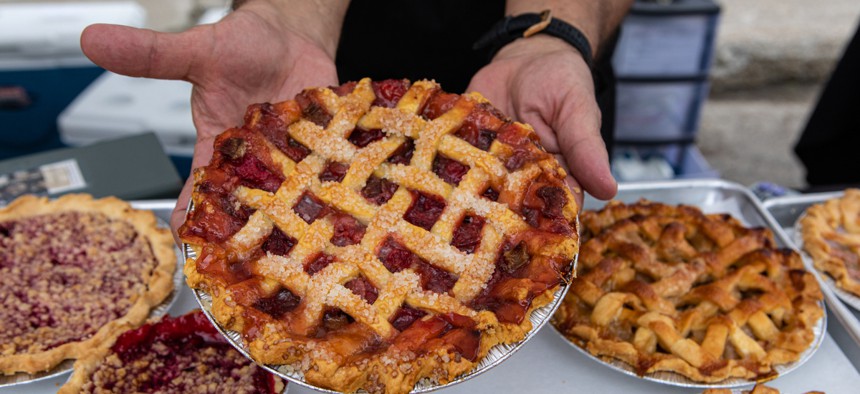Wyoming Makes It Easier to Sell Homemade Food

Wyoming is expanding where homemade foods can be sold. Shutterstock

Connecting state and local government leaders
STATE AND LOCAL ROUNDUP | Judge rules South Carolina ban on LGBTQ sex education unconstitutional … Florida may preempt local sunscreen bans … D.C. bans ‘ghost guns.’
Wyoming Gov. Mark Gordon signed into law measures that will expand the Wyoming Food Freedom Act, which allows homemade food businesses to sell their wares to consumers. Previously, the law only allowed producers to sell their products directly to consumers at farmers markets, roadside stands next to farms and ranches or in their homes. Now, homemade foods can be sold by third-party vendors, as long as they “inform the end consumer that the homemade food is not certified, labeled, licensed, packaged, regulated or inspected.” An amendment that would have allowed grocery stores to sell homemade food items failed to pass the state legislature. Still, the bill’s author, state Rep. Shelly Duncan, celebrated the passage of the expansion. “[This bill] will create more income for farmers, stay-at-home parents, retirees, and anyone else who has talent in the kitchen. The bill will also allow consumers to buy more fresh, healthy and local food at affordable prices,” Duncan said. The new measures also change the definition for homemade food producers from those who merely cook in their home kitchens to anyone who “grows, harvests, prepares or processes any food or drink products on the person’s owned or leased property,” as long as their sales are less than $250,000. The Institute for Justice, which worked with Duncan to create the legislation, said that Wyoming has the most permissive homemade food law in the country. “Since the law took effect in 2015, there has not been a single outbreak of foodborne illness from food sold under the law … The food freedom movement is spreading across the country, creating new economic opportunities, especially for women and rural communities,” the group said. [Oil City News]
LGBTQ EDUCATION | A federal judge in South Carolina has overturned a state law that prohibited LGBTQ sex education in public schools. The suit was brought by LGBTQ advocacy groups and challenged a law passed in 1988 that made it illegal for teachers to discuss “alternate sexual lifestyles from heterosexual relationships.” Julie Wilensky, a senior attorney for the National Center for Lesbian Rights, said the law was discriminatory. “There's no comparable restriction in the law on health education about different sex relationships. After 32 years, students in South Carolina will no longer be harmed by this outdated law,” she said. South Carolina Superintendent of Education Molly Spearman, who was named as a defendant in the lawsuit but did not fight for the law to remain in place, said the decision moves South Carolina forward. “The balance of protecting freedoms and preventing discrimination will be upheld in any guidance we send to schools on this issue,” she added. [NBC News]
SUNSCREEN BAN | The Florida legislature passed a measure that would preempt local governments from regulating any over-the-counter drugs or cosmetics, including sunscreen. The measure came after the city of Key West banned sunscreens that contain certain chemicals that are harmful to coral reefs. State Rep. Ralph Massullo, a Republican, said that sunscreen should be widely available. “We have plenty of empirical evidence that sunscreens are very, very important to our society, that they save lives. By banning them, we’ll be threatening lives,” he said. Key West Mayor Teri Johnston said lawmakers are “ill-suited” to pass preemption measures about issues they are unfamiliar with. “If [they] would have spent one weekend down in Key West, [they] could have seen the impact on our coral reef. It’s a really, really bad move and poorly thought out,” she said. The preemption measure now heads to Gov. Ron DeSantis for his signature. He last year used his veto power for the first time on a preemption bill that would bar local governments from banning plastic straws. “The state should simply allow local communities to address this issue through the political process,” DeSantis said then. [Miami Herald; Associated Press]
GHOST GUNS | D.C. Mayor Muriel Bowser signed emergency legislation banning kits used to assemble “ghost guns.” The number of home-built firearms seized by D.C. police spiked in the past few years, from three in 2017 to 116 in 2019. [Washington Post]
HORSE CARRIAGES | The Chicago City Council is considering a measure that would ban horse-drawn carriages. Animal rights activists have requested such a ban for years. [Chicago Tribune]
Emma Coleman is the assistant editor for Route Fifty.

NEXT STORY: Washington Schools Work on Meal and Child Care Plans For Extended Closure





